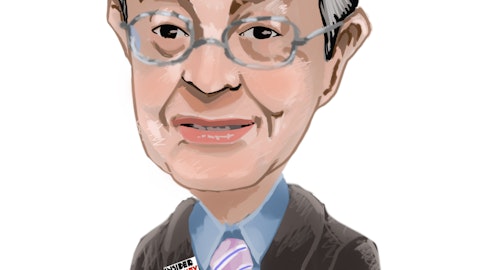Jim Deller: I mean, let me — I’ll say a few words, and I’m actually going to pass over to Brent, because he can talk a lot more accurate about revenue and the recognition requirements. This industry is inherently lumpy, especially on the process burners, the orders, right? Tend to be very large, which is very good. But when the orders are large and they’re also based on critical milestones, as you pass those milestones that does, right trigger a lump if you like in the revenue stream. So at this stage of our development, the financials are going to be lumpy on a quarter-by-quarter basis. But for details, I’m going to pass over to Brent.
Brent Hinds: Yes. So, for Q1 specifically to talk about Q1 and give just some color. If you look at the milestones that we met, as Jim talked about, we’ve — as performance test, we’ve met those milestones, the contractual obligations, we’ve received cash for those contractual obligations. So, for Q1 revenues will be recognized and they’ll be significant, very significant. Just to give some color, they’ll be way more than what we recognized in all of 2022.
Amit Dayal: Great. Thank you. Thank you, Brent. No, that’s helpful. And maybe I can follow-up with some other questions around this topic offline, as well as. You guys had some success in Europe, I believe, last year. Is there any further traction in that market for you guys?
Jim Deller: We are in discussions with European customers. We’ve — as I said before, we have very good context throughout the industry, especially with heater manufacturers and the refiners and we meet with them. I mentioned the American Petroleum Institute conference we’ll be attending in Seattle, so we meet with them frequently. We talk about their upcoming projects. The most important aspect of that European relationship today is that, that was a installation in a major global refiner, who also has very prominent refineries in the California market. So the — what we’re really focusing on with our client and our discussions are their progress with the regulation obligations where the South Coast and the heater projects that they have in California.
So, this truly is a global industry and that European installation gave this client a chance to install our burner to get in their hands on it to see it operating it’s been operating in their refinery now for, I believe, over a year. So given them good experience as they look to their much bigger requirement for low emission equipment in California.
Amit Dayal: Understood. Yes, that’s all I have, guys. Thank you so much.
Jim Deller: Thank you, Amit.
Operator: The next question comes from Robert Kecseg with Las Colinas Capital Management. Please go ahead.
Robert Kecseg: Hi, Jim. Thanks for all the great news and thanks for all the hard work everyone has put in at the company, the pace to be patient. I was going to say on your boiler burner
Jim Deller: Thank you for that.
Robert Kecseg: You bet, on the boiler burner recent one with Tulsa Company, the thing that jumped out at me was that they were replacing the existing heater and the SCR. So is that just, kind of, part and parcel of what we’re selling to the Tulsa heaters and the reason why they’re using us is because it is a replacement for the SCR? And, I would — I wonder if that’s kind of telling us what our path is through these, kind of, companies to distribute our product.
Jim Deller: Yes. Bob, it’s — you’ve obviously looked at that in detail to pick this up. This was exciting for us just to help people understand what happened here. The new heater from total heater midstream is replacing the existing heater, total heater midstream have elected to use our burner to meet the permit requirements of the client rather than putting a SCR on the heater as the heater that is being removed had. I think, we’ve always seen our competition as SCRs rather than other burner technology, because of the level of NOx reduction that we can achieve with our burners. This is just a very good evidence of that in play, right? This has allowed Tulsa midstream to have a much more efficient heater, we believe a much cleaner heater, because there’s no longer the need to bring in ammonia or to have the ammonia slip passing out in the emissions of that heater.
So, I believe we’re providing a much better business for Tulsa in the midstream and a much better solution for this client in Texas.
Robert Kecseg: Yes. And I think that they already have an established company with customers that they’ve serviced for a number of years. Could you kind of speak to that a little bit? And then are there other, kinds of, companies like Tulsa heaters that then would be maybe awakened as to the other side?
Jim Deller: Yes. So for clarification, the technically, the client for this order was Tulsa Heaters Midstream. At Tulsa Heaters Midstream, and their sister company Tulsa Heaters are very closely related in Tulsa, but they are separate companies. But from their name Tulsa Heater Midstream has a product that is targeted for the midstream industry and that is their strength. They are very well known. They have a very good reputation. They are very well run. And I do believe they have a lot of respect in the industry. And I very much forward — look forward to the other heater companies, seeing what Tulsa Heater Midstream have done. I’m sure they are watching this project, and I really look forward to the news of the installation and look forward to our burner getting out into the industry and into that Texas market?
Robert Kecseg: Yes. I’m asking that because the previous question about pipeline that, kind of, gives us some sort of improved belief that our pipeline can expand through companies like them and other ones that do more work?
Jim Deller: Yes. Paul, thanks for takin, you know, I mentioned it briefly in the comments earlier, that the heater companies provide a big channel to market for us is one that I believe will pick up significantly once they get confidence, including our technology as part of their solution. Because for them to install ClearSign burners rather than including an SCR in the heaters, we’ll save their money up it makes the products lighter. It also avoids having to include all of the equipment to handle ammonia and for their clients, it gives their clients what we believe is a much better solution. I believe what’s holding them back is obviously, they are making guarantees to their customers and they are putting their names behind their products.
And there is some reluctance to do that with a brand new technology, no matter how good you believe it is, when you do not have references and experience of others to point to in the field. Getting these products out to market is so important to us, because it truly gives our customers confidence, we also believe it will give channel customers such as heater manufacturers’ confidence to work with us in the future for what we believe is going to be a much better solution for them and a better product for their customers.

